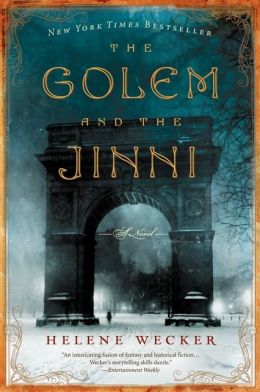It occurred to me a while back that I don’t read enough of what gets named in the James Tiptree Award honour list. And since I loved Hild and Ancillary Justice, to name two of the novels featured on the current list, I decided to try to rectify my oversight.
And—what could be more natural?—share the results of the experiment here. So today, let me talk about Helene Wecker’s debut novel, The Golem and the Djinni (written as The Golem and the Jinni for the US market), a lovely and accomplished book—and one I find myself a bit bemused to see on that Tiptree honour list. It’s a marvellous book, don’t get me wrong, but I don’t quite see how it fits the criteria of a novel that “expands or explores our understanding of gender.”
In Poland in 1899, an unscrupulous mystic creates a golem to serve as wife to a Jewish businessman who’s emigrating to New York. When her master dies on the voyage, the Golem arrives alone in a strange city: a woman of clay designed for servitude set masterless and adrift to make her own choices when only a few days old. Capable of (though she does not desire it) great violence, able to hear the desires and needs of humanity, and capable of inspiring great fear. Taken in by an elderly rabbi who recognises her for what she is and chooses to help her, she gradually learns to pass for human: human enough to keep a job, to make connections. But she is always wary of the fear that her Otherness could inspire, and the violence she could commit.
Trapped for centuries in a copper flask, the Djinni returns to life in the workshop of a Syrian tinsmith in Lower Manhattan. Caught in human form, with no memory of how he came to be imprisoned and bound, he too must make a life as a man. A creature of fire, of whim and movement and passion, he chafes at the constraints imposed on him, and wanders the city at night in search of some palliative for his boredom.
One night, he meets the Golem.
Their friendship is an unlikely one, and threatened by their respective natures. And, ultimately, by the avarice of a man who wants to live forever.
Wecker evokes the impression of a fable here, in her straightforward prose and lucid narrative style, in the broad strokes she uses to sketch out landscape and cityscape, the characters of the Syrian and Jewish communities of fin-de-siècle New York. Such broad strokes risk, of course, falling into stereotype, but the fairy-tale quality of the narrative—and what a gorgeous, fluid, whimsical-profound narrative it is!—makes it easier to read these sketches in the light of archetypes, human figures for the fable.*
*Of course, I’m neither Syrian nor Jewish, and have never been an immigrant: it’s doubtless easier for me to extend the benefit of the doubt.
Above all else, this is a fable of immigration. The Golem and the Djinni are doubly estranged, twice immigrants. Mythical creatures resident in a human world of bakeries and tenements, pawnshops and ice-cream sellers, they are also residents of immigrant communities. Part of the fear that animates the two humans who know their true natures—Avram the rabbi and Arbeely the tinsmith, respectively—and drives them to insist that the Golem and the Djinni pass for human, is the conviction that if the wider world discovers them, it will turn on the community that shelters them as well. Both Golem and Djinni are learning to navigate strange worlds, of which perhaps the strangest is the web of human connections around them.
The feeling of estrangement, of outsiders moving in strange worlds, is deepened by the way in which the text continues to refer to the Golem and the Djinni by those terms, and not by the (human) names which the people around them use. Wecker draws us into empathy with the Golem and the Djinni without ever falling into the trap of eliding their Other-ness: she humanises them without making them human.
In many ways this is a very intimate book, a book of interiors and identities. For a debut novel, it’s stunningly accomplished. I really enjoyed it. I recommend it.
And I’m very much looking forward to what Wecker does next.
Liz Bourke is a cranky person who reads books. Her blog. Her Twitter.










